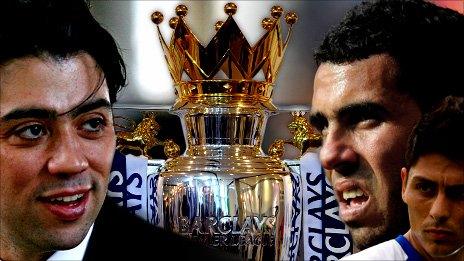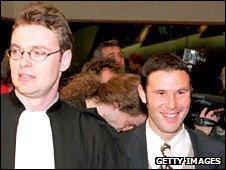Third-party owner rule not 'legitimate' - Bosman lawyer
- Published

Third-party ownership is common in South America
The Premier League's third-party ownership rules are "not legitimate", says a leading sports lawyer.
Jean-Louis Dupont helped Jean-Marc Bosman change the law in 1995 to allow players to move for free at the end of their contract, external.
And he believes the rule that requires top-flight clubs to fully own the economic rights of a player is illegal.
A Premier League spokesman said members wanted to avoid problems experienced with the rule in South America.
The idea of shared ownership - where a club might own 50% or more of a player with the remaining percentage owned by a third party - is common in the rest of the world, particularly in South America.
The Premier League ban on third-party ownership was introduced at the start of the 2008-09 season to protect the "integrity of competition" following the Carlos Tevez affair, external.
West Ham were fined £5.5m by the Football Association in 2007, external after signing Tevez and Javier Mascherano and allowing the Media Sports Investment company to keep certain rights to the players.
That season, Tevez scored at Old Trafford, external to help keep the Hammers in the Premier League, leading to a long legal battle with Sheffield United over compensation for the Blades' relegation, external.
The prohibition on third-party ownership also applies to all Football League clubs and last season QPR were fined nearly £1m, external for breaching regulations in the 2009 signing of Alejandro Faurlin.
Dupont believes a legal challenge to the rule would have a "very, very good chance" of winning.
He told BBC Sport: "I have observed the Tevez case and the rule in the UK.
"I'm not convinced restrictions to that business are legitimate. Third parties would own rights of players and have an interest in the potential benefit of transferring a player from club A to club B.
"We are in a typical case where, in order to avoid the disease, you kill the patient. If you kill the patient, there is no disease - but there is no patient either.
"The main principle under EU law is the freedom of enterprise, where the restriction is the exception. You should start with the principle rather than the exception."
In Portugal one notable third-party owner is the Benfica Stars Fund, which is run by that country's biggest bank Banco Espirito Santo.
And Dupont posed the question of what the difference is between a club using a third-party owner and going to a bank for a loan to buy a player.
He said: "This is a typical sports federation over-reaction. There are reasons for a federation to be careful when you see third parties investing in football but it does not entitle them to over-react to cancel the freedom of somebody.

Dupont worked on the landmark Bosman case
"The rule is not proportionate. The objective is to protect the game - the ethics of it.
"But to achieve that you cannot just say 'no' to third parties. It's clearly excessive. What is the difference between having a fund [third party] buying a player and a bank doing it?"
Lawyer Guy Thomas, external said: "It's fair to question whether the Premier League rules on this could be shown to be restrictive.
"If a claim was made and a restriction shown then the Premier League would need to justify its regulations.
"A fight like this needs a spark - and few choose to enter litigation without a potential payday. The next time the holder of an economic right is forced to sell their interest to a Premier League club, the spark might arise if both sides cannot agree on what those rights are worth."
However Sanjay Nijran of Smithfield Partners argued that the leagues could be successful in any bid to retain the ban on third-party ownership.
"The football authorities would attempt to justify this rule based on 'competitive balance' and it has been shown in both case law and by the European Commission, external that 'competitive balance' is vital for sport and is a factor which separates it from normal industry.
"On this basis, it is likely that the European Court of Justice and European Commission would be able to objectively justify this type of rule."
A Premier League spokesman said: "The clubs decided that third party ownership was something they did not want to see.
"It raises too many issues over the integrity of competition, the development of young players and the potential impact on the football pyramid - it was felt the Premier League was in a position to take a stand on this.
"No-one wants to see what has happened to club football in South America repeated over here."